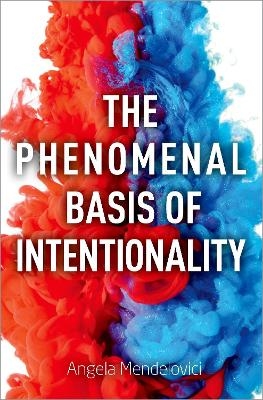
The Phenomenal Basis of Intentionality
Seiten
2018
Oxford University Press Inc (Verlag)
978-0-19-086380-7 (ISBN)
Oxford University Press Inc (Verlag)
978-0-19-086380-7 (ISBN)
Mendelovici proposes a novel theory of intentionality in terms of phenomenal consciousness, arguing that the view avoids the problems of its competitors and can accommodate a wide range of cases, including those of thought and nonconscious states.
Intentionality is the mind's ability to be "of," "about," or "directed" at things, or to "say" something. For example, a thought might "say" that grass is green or that Santa Claus is jolly, and a visual experience might be "of" a blue cup. While the existence of the phenomenon of intentionality is manifestly obvious, how exactly the mind gets to be "directed" at things, which may not even exist, is deeply mysterious and controversial.
It has been long assumed that the best way to explain intentionality is in terms of tracking relations, information, functional roles, and similar notions. This book breaks from this tradition, arguing that the only empirically adequate and in principle viable theory of intentionality is one in terms of phenomenal consciousness, the felt, subjective, or qualitative feature of mental life. According to the theory advanced by Mendelovici, the phenomenal intentionality theory, there is a central kind of intentionality, phenomenal intentionality, that arises from phenomenal consciousness alone, and any other kind of intentionality derives from it.
The phenomenal intentionality theory faces important challenges in accounting for the rich and sophisticated contents of thoughts, broad and object-involving contents, and nonconscious states. Mendelovici proposes a novel and particularly strong version of the theory that can meet these challenges. The end result is a radically internalistic picture of the mind, on which all phenomenally represented contents are literally in our heads, and any non-phenomenal contents we in some sense represent are expressly singled out by us.
Intentionality is the mind's ability to be "of," "about," or "directed" at things, or to "say" something. For example, a thought might "say" that grass is green or that Santa Claus is jolly, and a visual experience might be "of" a blue cup. While the existence of the phenomenon of intentionality is manifestly obvious, how exactly the mind gets to be "directed" at things, which may not even exist, is deeply mysterious and controversial.
It has been long assumed that the best way to explain intentionality is in terms of tracking relations, information, functional roles, and similar notions. This book breaks from this tradition, arguing that the only empirically adequate and in principle viable theory of intentionality is one in terms of phenomenal consciousness, the felt, subjective, or qualitative feature of mental life. According to the theory advanced by Mendelovici, the phenomenal intentionality theory, there is a central kind of intentionality, phenomenal intentionality, that arises from phenomenal consciousness alone, and any other kind of intentionality derives from it.
The phenomenal intentionality theory faces important challenges in accounting for the rich and sophisticated contents of thoughts, broad and object-involving contents, and nonconscious states. Mendelovici proposes a novel and particularly strong version of the theory that can meet these challenges. The end result is a radically internalistic picture of the mind, on which all phenomenally represented contents are literally in our heads, and any non-phenomenal contents we in some sense represent are expressly singled out by us.
Angela Mendelovici is Associate Professor of Philosophy, University of Western Ontario.
Part I: Introduction
Chapter 1. Fixing Reference on Intentionality
Chapter 2. Goals and Methodology
Part II: Alternative Theories of Intentionality
Chapter 3. The Mismatch Problem for Tracking Theories
Chapter 4. Functional Role Theories and Tracking Theories Again
Part III: The Phenomenal Intentionality Theory
Chapter 5. The Phenomenal Intentionality Theory
Chapter6. PIT's Status as a Theory of Intentionality
Part IV: Challenging Cases
Chapter 7. Thought
Chapter 8. Nonconscious States
Part V: The Aspect View
Chapter 9. Is Intentionality a Relation to a Content?
Part VI: Conclusion
Chapter 10. Conclusion: Intentionality and Other Related Phenomena
| Erscheinungsdatum | 01.08.2018 |
|---|---|
| Reihe/Serie | Philosophy of Mind Series |
| Verlagsort | New York |
| Sprache | englisch |
| Maße | 157 x 236 mm |
| Gewicht | 517 g |
| Themenwelt | Geisteswissenschaften ► Philosophie ► Metaphysik / Ontologie |
| Geisteswissenschaften ► Psychologie ► Allgemeine Psychologie | |
| Geisteswissenschaften ► Psychologie ► Verhaltenstherapie | |
| ISBN-10 | 0-19-086380-3 / 0190863803 |
| ISBN-13 | 978-0-19-086380-7 / 9780190863807 |
| Zustand | Neuware |
| Informationen gemäß Produktsicherheitsverordnung (GPSR) | |
| Haben Sie eine Frage zum Produkt? |
Mehr entdecken
aus dem Bereich
aus dem Bereich
eine philosophische Reise
Buch | Softcover (2024)
Goldmann (Verlag)
14,00 €
Auf dem Weg zu einer postkritischen Philosophie
Buch | Softcover (2023)
Suhrkamp (Verlag)
38,00 €


